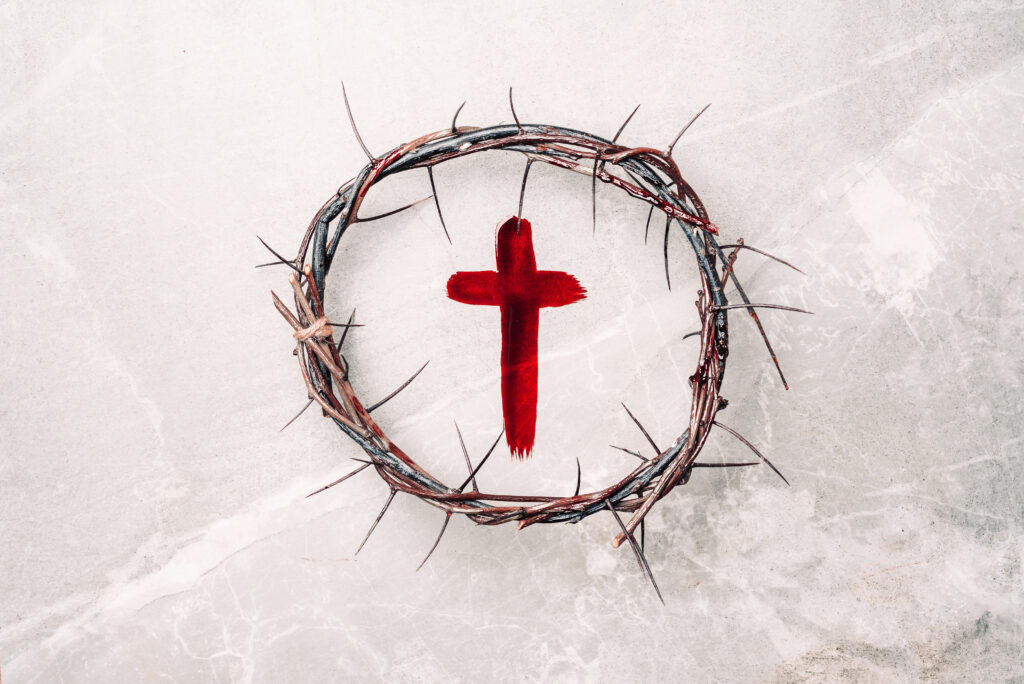Living Hope w/ Mandy Smith
Welcome to the Gospel Reverb podcast. Gospel Reverb is an audio gathering for preachers, teachers, and Bible thrill seekers. Each month, our host, Anthony Mullins, will interview a new guest to gain insights and preaching nuggets mined from select passages of scripture, and that month’s Revised Common Lectionary.
The podcast’s passion is to proclaim and boast in Jesus Christ, the one who reveals the heart of God, Father, Son, and Holy Spirit. And now onto the episode.
Anthony: Hello friends, and welcome to the latest episode of Gospel Reverb. Gospel Reverb is a podcast devoted to bringing you insights from scripture found in the Revised Common Lectionary and sharing commentary from a Christ-centered and trinitarian view.
I’m your host Anthony Mullins, and I’m jazzed to welcome our guest this month, Mandy Smith. Mandy is the pastor of St. Lucia Uniting Church near Brisbane, Australia. She’s the former pastor of University Christian Church in Cincinnati, Ohio. And for those of you that may be geographically challenged, those are not nearby neighbors. That’s not a Sunday afternoon drive, so that’s going to be a fascinating story to hear.
She’s also a cohort leader at Western Theological Seminary and is the author of some exceptional books, including Unfettered: Imagining a Childlike Faith Beyond the Baggage of Western Culture, and Almost There: A 30 Day Journey Where Tomorrow’s Uncertainty Takes a Back Seat to The Promise of Today, The Vulnerable Pastor, and her latest book, which will come out in the fall of 2024, which is entitled, Confessions of a Secular Saint.
I highly recommend these books to you wherever you get your books. I’ve listened to Mandy on several podcasts, and she is a trusted voice in the body of Christ. And if you want to know more about her, you can find that information on her website, which is thewayistheway.org. Once again, that’s thewayistheway.org.
Mandy, thank you for being with us and welcome to the podcast. I know you’ve gotten up early since you’re in Australia. Thank you for that. And since this is your first time joining us, we’d love to know a little bit about your story and how you are participating with the Lord these days.
[00:02:10] Mandy: Yeah. It’s so good to be with you and it’s wonderful to have an opportunity to join the conversation that you’ve already got going on here.
I grew up in Australia but left to go to university with my very new husband back in 1989. Planning to go for 10 years so that we could return to ministry in Australia, which is what we’ve always felt called to do.
And doors kept opening in the US and the UK and doors kept closing in Australia. Until the middle of Covid, then suddenly something opened up. And I would not recommend an international move in the middle of a global pandemic. That was a crazy time. So about two years ago then we moved back to Australia and I was originally from working with the churches of Christ.
And now we are working with the Uniting Church in Australia, which is in the 1970s in Australia, Presbyterians, Methodists, and Congregationalist churches (for the most part) most of them joined to become this denomination of the Uniting Church in Australia.
So I’m still learning about what it means to be a part of the Uniting Church, but similar to my upbringing, there’s a passion for unity, as you can hear in the name. And the Restoration Movement, Churches of Christ that I grew up in were a unity movement—in theory—as well. We don’t always get it right, but that’s the desire and that really resonates with my own heart, that even though we’re all very different when we unite around the body and the joy of Christ, then we find something in common with one another.
And it defies the world’s way of understanding when they can say, what do those people have in common? Because it makes no sense that they would be together.
So that’s where I am now. I’ve been here at St. Lucia Uniting Church for about 18 months now, and I was placed here by the presbytery as part of a regeneration project. The congregation was pretty close to closing. Had about 12 people in their 70s and 80s when I first arrived. And they decided, no, we’re going to give it one more try. And so, my hiring was a part of their effort to do that.
Yeah, I’m seeing God doing a lot of miracles, and it’s really hard work. But we are growing and I think these days, numbers aren’t everything but we’re getting 35 or so on a Sunday now. God’s doing something and drawing people to us and drawing people who are really hungry and coming out of some really difficult situations.
So it’s exciting to be a part of that.
[00:04:44] Anthony: God’s always up to something.
Mandy: Oh, my goodness. I wish he’d tell us what it was.
Anthony: Right. I think it is wisdom he only allows us to see around the bend just a bit. Otherwise, we’d run in the opposite direction if we knew what was ahead. But it’s always good. It is always good.
Let’s get to it. We’re here to talk about the lectionary passages for the month of April.
Philippians 2:5-11 “Kenosis”
Matthew 28:1-10 “Don’t Be Afraid”
1 Peter 1:3-9 “Living Hope”
1 Peter 1:17-23 “Mutuality Through Kinship”
1 Peter 2:19-25 “Suffering Is Universal”
Let me read the first passage of the month. It’s Philippians 2:5-11. I’m reading from the New Revised Standard version. It is the Revised Common Lectionary passage for the liturgy of the passion on April the 2nd.
Let the same mind be in you that was in Christ Jesus, who, though he was in the form of God, did not regard equality with God as something to be exploited, but emptied himself, taking the form of a slave, being born in human likeness. And being found in human form, 8 he humbled himself and became obedient to the point of death—even death on a cross. 9 Therefore God also highly exalted him and gave him the name that is above every name, 10 so that at the name of Jesus every knee should bend, in heaven and on earth and under the earth, and every tongue should confess that Jesus Christ is Lord, to the glory of God the Father.
Mandy, this is one of my favorite passages, the Christ hymn. This beautiful sweeping text that’s sometimes referred to as a kenosis passage. Kenosis being a self-emptying that we see in Jesus Christ.
Why should we be in awe of this kenosis reality of God revealed in Jesus Christ?
[00:06:45] Mandy: Yeah, you’re right. It’s a huge sweeping text and not only the concepts that it describes, but the poetry of it is just transcendent. And I guess that’s all we can do when there’s something that’s so beyond our understanding of God emptying himself to become like us.
Like how could we even wrap our minds around that? And sometimes poetry is the only thing we have to actually communicate. One plus one does not always equal two. We can’t have scientific language about this kind of thing. And so to be transformed, to be swept away in the beauty of the poetry, I think is a part of what’s happening here.
But what a crazy thing. I think if we were going to invent a God, we would not invent a God who did that. That makes us really uncomfortable because if we were going to be God—if I was going to be God, I wouldn’t even think that was the way to do it.
I would assume being a God is always lording over everybody, and what a way that Jesus lords over us by serving us and emptying of all of that in order to become like us. And I confess that most of my Christian experience has been more about Jesus as God. And it’s only been in recent years that I’ve really been trying to embrace this possibility that Jesus was also human.
And I think I’ve learned a lot about what it means to be human by studying Jesus. I think he was more willing to be human than we often are, and I see it in this kind of kenosis. We see this kind of happening in some kind of galactic space, like at the beginning of some kind of science fiction movie or something of this emptying happening in a place where we can’t see and happening before Jesus was born.
But we see it in his daily experience as well, that the story of something like his temptations in the wilderness. I see him doing that, that he’s choosing once more not to go back to being God. I think that the enemy is actually saying, hey, don’t forget your God. You could feed yourself any time you like, you can make the stone into bread. Just be God again and then you won’t have any of these problems. You can make sure that everybody bows down and worships you. You have the power. Just do it.
And so, when I read those temptations, I hear Jesus refusing to give up his ordinary human limitation and to just keep following the Father one day at a time.
And in that I see lessons for my ordinary human limitations as well. So that’s one reason why this is one of my favorite passages.
[00:09:19] Anthony: He is the true human, and he shows us what it looks like to be human. And sometimes we want a superhuman God, not the God that we have. That’s what we received, the God that we have given to us in Jesus Christ.
And so I want to ask you this, and this feels a bit like an unfair question because there’s so much gospel in this text, but if you were preaching this pericope to your congregation, what else would you herald?
[00:09:45] Mandy: Yeah, just this way that this is the way of Jesus and if we are following him, don’t be surprised if it’s the way that we are called into as well.
On a personal note in probably in the last eight years or so, I’ve entered into a practice of emptying prayer simply because God has put me in some places that make me really anxious and that feel way over my head. And out of that anxiety, I’m tempted to just work harder and try to be God basically.
And the only thing I know to do, and I do this every single morning, I do this every time I feel overwhelmed—which is often—to instead of trying to fill myself up, being called to empty and say, Lord, I just confess all the ways I’m trying to fix this on my own, and all the ways I feel in over my head.
And that was all I thought I was doing. Like I just thought that’s what needs to happen in order to just minister more honestly, and not from anxiety. But if I’ve ever felt the feeling of the Holy Spirit, that’s when it’s come, and I’ve realized what I’m doing is emptying of my own power and control in order to be available for the Spirit that is already there.
Like, I think we often say, come Holy Spirit because we don’t feel the Holy Spirit. But that’s actually not what Scripture describes. Scripture describes a filling that we’ve already been given. And it’s lovely for us to say, come, to invite the Holy Spirit. But I think when we say that, the Holy Spirit is like, I’m already here. Will you just give me some more space?
It’s been crazy that there has been in that emptying prayer—and I actually have a video that I’ve created, pretty low budget one, but a guided prayer, kind of visualization prayer of emptying based on 2 Corinthians 4, that I’d be happy to share with you if you want to share it with folks, because it’s basically the prayer that I do.
When I’ve done that emptying prayer, without expecting it, finding myself with an idea or a passage of scripture that’s come to me, or some comfort or encouragement or courage that I’m realizing now that power was always available to me. That comfort and guidance was always available to me, but I was just too busy trying to fix everything myself.
And that feels like really good news to me that this is not only Jesus’ story. But it’s our story, that when we empty, it makes us available to the work of God in a way we may not have ever known.
[00:12:13] Anthony: And thanks be to God that he is trustworthy to fill us up. That there doesn’t need to be fear in the emptying of ourselves just as we see in Jesus Christ.
And yes, we’d love to have access to that low budget film of yours, on the emptying prayer. So we’ll include that in the show notes.
And just a final thought—we don’t have time to get into it—but in the close of this pericope, we see every knee bending, every tongue confessing. And it made me think of a quote I saw once from Frederick Buechner and he said, “The final secret, I think, is this: that the words, ‘You shall love your God’ become in the end less a command than a promise.”
That eventually we just step into the reality. Of course, we want to be with you for eternity when we come face to face with the Lord.
Let’s transition to our next passage of the month. It’s Matthew 28:1-10. It is the Revised Common Lectionary passage for Easter Sunday on April the 9th.
Mandy, would you read it for us, please?
[00:13:14] Mandy: I love Easter Sunday. I get to read that passage. So yes,
After the sabbath, as the first day of the week was dawning, Mary Magdalene and the other Mary went to see the tomb. 2 And suddenly there was a great earthquake; for an angel of the Lord, descending from heaven, came and rolled back the stone and sat on it. 3 His appearance was like lightning, and his clothing white as snow. 4 For fear of him the guards shook and became like dead men. 5 But the angel said to the women, ‘Do not be afraid; I know that you are looking for Jesus who was crucified. 6 He is not here; for he has been raised, as he said. Come, see the place where he lay. 7 Then go quickly and tell his disciples, “He has been raised from the dead, and indeed he is going ahead of you to Galilee; there you will see him.” This is my message for you.’ 8 So they left the tomb quickly with fear and great joy, and ran to tell his disciples. 9 Suddenly Jesus met them and said, ‘Greetings!’ And they came to him, took hold of his feet, and worshipped him. 10 Then Jesus said to them, ‘Do not be afraid; go and tell my brothers to go to Galilee; there they will see me.’
[00:14:24] Anthony: Hallelujah. Praise God. It is resurrection Sunday, and I don’t know if you struggle with this, Mandy, but I sure do. When it’s holy week, I get a sense of just this feeling of I’m an imposter. Imposter syndrome.
How do I ever preach a sermon on Easter Sunday? How is that done? Of course, it’s by the Spirit, but it’s always quite intimidating and overwhelming. But there is so much to say and so little time in a sermon (and of course in a podcast like this), but we try.
So what Christological thoughts would you like to share in light of this passage?
[00:14:54] Mandy: Yeah, I’m just struck when we are reading, in tandem with the previous passage that, again, the good news comes from something that’s just the opposite of what human beings do. Again, if I was going to be God, I would do something much more spectacular than just leave an empty space .
And I think there’s something really beautiful about God’s willingness, his true trust, in what happens in the small things, in even the emptiness, that he sees the miracle of what can happen.
It’s not spectacular in the way that we would expect spectacular things. Although of course, it is spectacular that soon they’re to see his risen body. And what an amazing thing! We can’t even wrap our heads around that, beyond just if you had a friend who died and then came back to life.
That’s one thing—just to see someone that you love again. But then to think, okay, and we believe this person to be the Son of God, and what does this mean for everybody, not just those who’ve been friends with him?
I love to try when I do enter into preaching this passage—and I hear you on that, who am I to speak such a wonderful truth? But I think in some ways—I have a friend who says, awe can lead us—no, he says anxiety can be expressed either it can devolve into this wrestling or it can also be an invitation into awe. And so, I think what we feel in that lead up to Easter Sunday is a sense of the weight of what this thing is.
And that weight can press us down and say, I’m just a small human being. Who am I to carry this message? Or it can move into a space of awe, of this is massive and I’m only small but the mystery of it! I think in some ways that’s an invitation—a little bit of an invitation into a small part of the experience of what they experienced on the day, of what on earth have we been given to carry on this day?
We don’t even understand it, but we’re going to proclaim it anyway. And those women didn’t have a chance before they ran to tell the disciples to figure out what on earth they had just seen and to fully understand it. But they spoke with the joy of it anyway. And that’s the only thing I can do on Easter.
[00:17:16] Anthony: You were mentioning the context that aligns with Philippians, the emptiness that is there. And I think it was Barbara Brown Taylor—I once read her talking about how new life often starts in the dark, whether it’s a seed in the ground, a baby in the womb, Jesus in the tomb, right? So even when it’s dark about us, that may not be the true reality because beyond it is something beautiful.
And I sometimes hear people say, Mandy—and maybe you’ve heard the same—that the disciples abandoned Jesus at his death And there was abandonment, of course, but I also see the women going to him and being the evangelist, if you will, sharing this great message. Tell us about it.
[00:17:59] Mandy: Yeah. I know a lot of women who feel called to proclaim the good news are very encouraged by this passage, especially if they’re in contexts that don’t affirm them in their calling.
I’m really hesitant to say—because I always want to be welcoming to my brothers. And I never want to communicate from the pain of my experience as a woman in the church. And it’s hard for me to communicate from that because I also want to bring healing between men and women, and I don’t want to perpetuate all of the brokenness between men and women.
And at the same time, I think it is really good to share it is really painful to feel that calling and to not always be given an opportunity to share it.
But the interesting thing for me because I don’t know if I’ve shared this with you, but the denomination I was a part of in the US did not ordain women for leadership. And that was the seminary I went to and also the churches I served.
And so, I was the first female lead pastor among a communion of 6,000 congregations, which put me in a really, really difficult space as a young adult in college and then in the process—and I’m not an aggressive person. I’m not an ambitious person. I hate the limelight, I hate conflict. I’m a nine on the Enneagram if you care about those things. So it’s been incredibly painful for me.
But all of that is to say, the ways that—and I think if I’ve ever had abuse, it has come from ways that people have treated me in that whole context. But every single time somebody has not received me or has not treated me in the way that Christ would treat me or has not recognized what God is doing in me—and I’ve had some really painful experiences—every single time, it has been an invitation for me to talk to the Lord again and to say, who are you again? What are we doing here again? Who do you say I am again?
And for anyone who’s marginalized—which is not just along gender lines, but many different ways people are marginalized—it can be a really empowering experience if it becomes an opportunity for us to say once more, who are you again? Who am I again?
And so—I saw this in Covid too—when everything hits the fan, it’s often those who have been on the margins, for whom the system has not been functioning anyway, who actually have real leadership to offer in that space. And that’s how I see this passage. These women were not given much of anything really in the system. And so when the status quo falls apart, they have something that enables them to press through.
And so I think that’s just what wisdom for us to look for when—because at the moment, I think everything is hitting the fan, not just because of Covid, because of all kinds of factors that are bringing us to a place of crisis in the church and around the world.
So how do we listen to the voices who are saying, you know what? Before you were aware that the system was falling apart, it wasn’t serving me anyway, and I’ve had to function within the system according to the kingdom. How can we invite those people to be leading, as these women had the opportunity to, when Jesus was dying and coming back to life?
[00:21:18] Anthony: Amen and amen. And I want to say to you, Mandy, we don’t know each other, but I sure am thankful for you and admire you for especially saying yes to the invitation to be the first ordained women in your space. It’s a beautiful thing, and we thank God for your ministry.
Let’s move on to our next passage. It’s 1 Peter 1:3-9. It is the Revised Common Lectionary passage for the second Sunday of Easter, April the 16th, and it reads,
Blessed be the God and Father of our Lord Jesus Christ! By his great mercy he has given us a new birth into a living hope through the resurrection of Jesus Christ from the dead, 4 and into an inheritance that is imperishable, undefiled, and unfading, kept in heaven for you, 5 who are being protected by the power of God through faith for a salvation ready to be revealed in the last time. 6 In this you rejoice, even if now for a little while you have had to suffer various trials, 7 so that the genuineness of your faith—being more precious than gold that, though perishable, is tested by fire—may be found to result in praise and glory and honor when Jesus Christ is revealed. 8 Although you have not seen him, you love him; and even though you do not see him now, you believe in him and rejoice with an indescribable and glorious joy, 9 for you are receiving the outcome of your faith, the salvation of your souls.
“By his great mercy, he has given us a new birth into a living hope through the resurrection of Jesus Christ.” Wowzer!
I believe theology Mandy should lead us to doxology, that our God-talk should lead to God-worship. So help us worship the God and Father of our Lord Jesus Christ by exegeting this staggering statement from verse 3.
[00:23:16] Mandy: So let me read verse 3 again here. “Blessed be the God and Father of our Lord Jesus Christ. By his great mercy, he has given us a new birth into a living hope through the resurrection of Jesus Christ from the dead.”
Yeah. It’s the center of everything that we are about, right? I love how the writers of the New Testament just break into praise and I love to imagine them—even though we are reading it on a screen or on a nice white piece of paper printed in beautiful text . I just love, if they’re writing it themselves or if they’re reading or speaking it aloud for an [inaudible] to write it all. Try to keep up and write it down as they go. I just love the thought of them, either way, the pen not being able to keep up with the words. They’re not just reciting a written doxology here. They are breaking into to genuine praise and being willing to share that.
If you received a letter with this kind of language, you would feel behind it the real worship of the person who was writing it. And even if I did receive a letter like this from somebody that I loved and trusted, I’m coming in after the end of a hot day, and I’m tired and I’ve got a letter in the mailbox and I’m opening up and I’m reading their words of rapture. And I’m like, oh my goodness, there’s some bills in the pile here as well. I think it’s good for us to give ourselves permission to not always be there with the person who’s writing these wonderful letters in the New Testament, but to choose to believe.
Oftentimes, I think that we have our theology backwards because we say, I’m going to try and think and think and think about this thing that I’m told in scripture is true: that we’ve already been given a new birth into a living hope, that because Jesus rose from the dead I should break into this kind of praise. We don’t feel the wonder of that on a regular basis, and it’s really hard for us to get our heads around it.
And I was raised in a tradition where we basically thought if you just keep thinking about it, if you just keep reading about it, then one day you might really understand it and then you’ll start to step into heartfelt worship. But what I actually have found is better, is to go in reverse: to live as if it’s true, to choose in practical ways to worship, to serve, to give as if these things have already been done for me. And somehow, it falls into place. Like the discomfort of living as if it’s true, actually allows you to experience it in a more genuine way.
Not all the time, of course, but it goes backwards (or it feels backwards) to say, how would I live if I really did believe that I’m already in this living hope through Jesus’ resurrection? And how might my stepping into it actually help me? The discomfort of that experiment might actually help me embrace it in more ways than hoping to understand it first.
[00:26:13] Anthony: Yeah. It often brings me to the Greek word for repentance. Metanoia is to think your way into a new way of acting. Whereas the Hebrew concept, teshuvah, is to act your way into a new way of thinking. And I think they work together. Sometimes we do need to have our minds renewed—to think our way into a new way of acting.
But I agree, sometimes you just have to do it. And it’s not necessarily “faking it till you make it”, but it is just stepping into that reality and seeing the miracles of God at your side.
Verse 6 informs us to rejoice while suffering. And sometimes, that’s a challenge, right? And so my question is, can lament and rejoicing be held together without contradiction? How does that work?
[00:27:02] Mandy: Yeah. I don’t know if we’re—I think you can do them at the same time, in a way, because my lament is usually growing from the joy that I have, that I can see what could be, that I’ve been promised—we’ve been promised.
God is making all things new, and we can see all the ways that things aren’t new yet. And so our lament somehow grows from our joy, from our desire to see that joy fulfilled. So I think there are always two sides of the same coin.
But for me, oftentimes, it comes in the order of what we see in the Psalms. That we are given permission by so many Psalms to just say, where are you, Lord? Are you even listening? Don’t you see the injustice? Don’t you see the brokenness? Are you watching? Are you hearing us?
And that is a kind of an emptying too. There’s a theme here, I think, that can feel like a kind of emptying. And if we don’t really believe in the filling that happens after we empty, then it just can feel like we’re just going into darkness. We’re just talking about hard things and we’re never going to emerge again.
And I often see this tension of, oh, we’re going to lose control if we lament, if we let people say what they’re really feeling then it’s just going to go down in a dark hole, and everyone’s going to be depressed. But I think when we lament in God’s direction especially, it’s not just complaining, it’s releasing. It’s emptying.
It’s trusting that there is somebody who actually cares about this stuff, who maybe even cares about it more than we do and who can take it when we beat on his chest, he’s not going anywhere.
And so something beautiful happens in that space because we do learn: oh, I’m not alone in this. Oh, God is not surprised by this. Oh, there is a space for me to be safe, to actually be honest and to share all the stuff that I’m just holding in. It’s really painful to feel a lot of pain, to feel frustration and anxiety, and to feel like God’s expecting us to just push it down.
To be able to release that, actually then (as we see in the Psalms of lament) they often turn into praise. They often return into natural rejoicing that was down there all along. Maybe it’s like I was saying before that we squash the Holy Spirit. Maybe the joy of the Holy Spirit is in us all the time, but it’s just so weighed down by the lament and we can access it once more when we let that lament come and be released to the Lord. And trust he can hold it and we don’t have to carry it on our own.
[00:29:33] Anthony: Hallelujah. Hallelujah. Emmanuel, God with us. That to me, that’s so reassuring and even in times where it feels like the fire is hot and the trials are coming fast and furious that God is with us, and he understands. We have a high priest who understands what it’s like.
Mandy, let’s go to our next passage of the month. It’s 1 Peter 1:17-23. It is a Revised Common Lectionary passage for the third Sunday of Easter, which is April the 23rd. Would you read it for us, please?
[00:30:06] Mandy: Yes. And this is my birthday, so it seems fitting that I would read this passage. Yeah, alright, here it is.
If you invoke as Father the one who judges all people impartially according to their deeds, live in reverent fear during the time of your exile. 18 You know that you were ransomed from the futile ways inherited from your ancestors, not with perishable things like silver or gold, 19 but with the precious blood of Christ, like that of a lamb without defect or blemish. 20 He was destined before the foundation of the world, but was revealed at the end of the ages for your sake. 21 Through him you have come to trust in God, who raised him from the dead and gave him glory, so that your faith and hope are set on God. 22 Now that you have purified your souls by your obedience to the truth so that you have genuine mutual love, love one another deeply from the heart. 23 You have been born anew, not of perishable but of imperishable seed, through the living and enduring word of God.
[00:31:11] Anthony: As I was listening to you read verse 19 about the Lamb of God, I was thinking about how I often want Jesus to show up as the roaring lion of Judah, the victor—which he is. But often the way that I experience him is as the lamb, broken for the world and for me. And I’m encouraged by that.
I just want to ask you what does it mean that God judges, all people impartially? And maybe as a tag onto that, how do we join in how he does this?
[00:31:40] Mandy: I think we often come to the word judge through our lens of the judicial system, that you’re engaging with an institution. And this is the judge’s job to do this. And in the Old Testament, the judges were spiritual leaders, people who sat in the gateway of the city. And if anybody had a dispute or a question or a problem, they sought the judges for their wisdom and for their discernment and for their mediation.
And I think we see God in a different way when we see God through this lens of judge, that this is not judgment in the sense that we think of it as in a legal sense. There’s a relational piece and a spiritual piece and a wisdom that we want truth. We want to be seen according to who we truly are.
And there are sometimes where I have been judged really harshly by human beings, and I want God’s judgment in that space because he knows what my heart really was. And there are other times where maybe I have got away with something when my motives were not good. And I need God to come.
This is the judgment he gives us even as we’re living, not just when we die. I want God to say, Mandy, that was not a good motivation right there. So either way it’s truth, and either way, it’s not for our damnation, but bringing us to the fullness of who God’s truly created us to be, to be our true selves and to reflect his goodness and his glory in ourselves.
So, it brings healing. This is the kind of judgment that ultimately brings healing and makes all things new. That’s how I try to see judgment.
And I think those who are in times of suffering as we see in books, especially in the New Testament, where there are people in oppression, they want to hear that those who oppress them—and we’re talking, blood’s flowing in the streets here. This is not just somebody teasing them. They want to know that there is a God who sees it and who will bring things to order. And so, I think we can judge them for writing such intense kinds of passages. And we see it in the Psalms too, where the psalmists are saying, God, will you come down from heaven and will you bring about judgment on this person who is oppressing me?
But maybe we don’t really understand what it feels like to be in that place of having someone who is a wolf at the door. And maybe if we were, we would also want that kind of God who can judge and make things right.
[00:34:09] Anthony: Yeah. We want judgment that’s healing, and therefore we see the vivid judgment of God at the cross. For God so loved the world that he gave his one and only Son, and he didn’t come to condemn the world but to save it through him. Hallelujah. Praise God.
Our theologian for today, Mandy, the apostle Peter, seems to believe that the purification of our soul should lead to genuine mutual love, experienced in kinship. So, my question for you is, how are we getting this right and how might we be getting it wrong?
[00:34:42] Mandy: Interesting. So actually, along the lines of what I was just saying as well, I’ve been really encouraged in recent years to be reading a little bit about the difference between the guilt gospel and the shame gospel.
So, folks who do ministry in places outside of Western culture often have to know this distinction between a culture that understands guilt and then the resolution of that is to have your sins forgiven in that usual sense that we talk about, the cross shaped bridge. We’re far from God because we’ve sinned and that’s definitely scriptural.
But in an honor, shame culture, which is often eastern cultures. And I think our culture. There’s been studies that have shown that our own Western culture is also becoming more this way. So this is not just something to learn when we go overseas anymore. They’re more—and this is getting to your question here—they’re more interested in shame and honor, which is a more relational thing.
So, the guilt thing, as I said earlier, can be more institutional. This is my personal sin, and I have been called up before this judge, and I have to be convicted or found guilty or innocent which is a personal, an individualistic kind of thing, whereas the shame on a culture is mostly to do with being outside of the community, being unacceptable somehow.
And this is actually how a lot of people come to understand their need for the gospel, that they feel not good enough for God. And so, if we are only evangelizing through the lens, oh, you know how you’ve sin. You’re a horrible person and you’re far from God. If they’re already feeling shame and excluded, then we have just made them feel even more that way by telling them they’re horrible people.
And there’s actually a great website, I think it’s just unashamed.com, where they’ve shared a lot of research along these lines, that the kinship is the thing that we are inviting people into. That scripture has lots of different ways of communicating what the gospel is to different cultures, and I think we’ve got stuck in that one way, in the guilt / innocence way.
But to understand the honor / shame way is to say, they often use more relational language, more communal language and family language. There is a family that you are being adopted into, and to be saved is to be welcomed once more. Again, you thought you were excluded, but you are included.
I think this is not just, oh, let’s all be friends so that we can feel warm fuzzies. But this is a salvation issue. This is a way that many people I know and myself as well, especially people who are marginalized. I think this is meaningful because they feel the shame of being excluded, of being marginalized. And for them salvation is Jesus has made it possible for you to be welcomed in and for you to be seen and known.
And kinship then is not just, let’s make friends but a salvation thing.
[00:37:33] Anthony: Yeah. I’ve often thought that salvation is best understood as belonging, which is relational. That you belong to God. And it’s good. He can be trusted. Come on in. The fire’s burning. Coffee tastes good. You belong here.
Our final passage is 1 Peter 2:19 – 25. It’s a Revised Common Lectionary passage for the fourth Sunday of Easter, April the 30th.
For it is to your credit if, being aware of God, you endure pain while suffering unjustly. 20 If you endure when you are beaten for doing wrong, where is the credit in that? But if you endure when you do right and suffer for it, you have God’s approval. 21 For to this you have been called, because Christ also suffered for you, leaving you an example, so that you should follow in his steps. 22 ‘He committed no sin, and no deceit was found in his mouth.’ 23 When he was abused, he did not return abuse; when he suffered, he did not threaten; but he entrusted himself to the one who judges justly. 24 He himself bore our sins in his body on the cross, so that, free from sins, we might live for righteousness; by his wounds you have been healed. 25 For you were going astray like sheep, but now you have returned to the shepherd and guardian of your souls.
Jesus Christ, bore our sins in his body so that we could live for righteousness. As a Spirit-empowered response to this reality, Mandy, what does it look like to live for righteousness?
[00:39:19] Mandy: That’s a big question. Again, it’s a strange reality. Again, if I was going to be God, I would not say, oh, the way we’re going to solve this is by me. My wounds are going to be the thing that’s going to solve the problem.
But I remember being on a retreat once in Kentucky, which I think is where you are. Am I right?
[00:39:39] Anthony: I’m from Kentucky. I live in North Carolina now. Very close.
[00:39:42] Mandy: Down there at the Abbey of Gethsemane, which is an amazing place for a silent retreat, and I was really carrying some serious suffering and feeling like this was a sign God had forsaken me.
And in many ways, I think to quote Barbara Brown Taylor again, she actually makes a distinction between pain and suffering. So, pain is the actual experience that cannot be denied, and the suffering is our belief about that experience that God has forsaken us, which we see Jesus wrestling with.
And in many ways, that’s worse than the actual pain. We see that in Job as well. That yes, you can’t argue with what he’s lost. But the question that most of the book of Job is about is why. What does this mean about your relationship with God?
So, I was in that place when I went to this Abbey, and it’s a Catholic setting, and so there’s crucifix hanging on the walls everywhere you go. And in my Protestant tradition, we don’t usually have a Jesus actually hanging on the cross still.
And so, I just was like, geez, Jesus, you just hanging everywhere, suffering everywhere I go. And it’s a real bummer. And I’m here to try to rest, and I just don’t want to be confronted with your suffering everywhere I go. You’re really spoiling it. I’m trying to enjoy my lunch here, Jesus. And you’re just hanging there on the wall looking at me. And something changed in me, and I came to see—especially people who suffer all around the world have that crucifix on the walls of their homes because (as much as I understand why we want to have an empty cross) because he’s resurrected now.
When we suffer, I need to know I’m not alone. This thing that had been judgment, had felt like, oh, that’s a sign God’s forsaken you because you are suffering and he’s not. Instead, I came to see, the solidarity that he has with me, and I have with him in that place. That, as it says in this passage, if you endure when you do right and suffer for it.
Jesus’ faithfulness to the Father is what took him to the cross. He could have stopped any time. He could have just said, oh, just kidding. I’m not really the Son of God. I’m not really going to do miracles. He could have got out of it anytime he wanted to, but he just kept saying yes, every single day to the Father, and even when he knew what was coming. You can feel this heaviness upon him of obedience and of knowing what it’s going to take, where it’s going to take him.
And to just suddenly realize that is our story, that when we do right and we suffer for it, we have God’s approval. It’s not a sign that we are forsaken by God. It’s as even though we see Jesus cry out on the cross, my God, why have you forsaken me? I refuse to believe that was because the Father had actually forsaken him. I believe that it was because Jesus was lamenting, as we were talking about earlier, and that psalm that he’s citing from Psalm 22, I think everybody would’ve known it and would’ve known the whole Psalm.
Which is the wrestling of a person who is in absolute agony and who still chooses to see that God has made things possible. And the end of that psalm sounds very much like he has done it. That gives me great hope and for me to live for righteousness means living in a way that embraces the possibility that even when I suffer—I don’t do right as perfectly as Jesus did, but it often is my desire to serve and to obey and follow that gets me into painful places. And to trust that the righteousness there is knowing, even though I don’t feel it, that we have God’s approval in that place.
[00:43:21] Anthony: I was sitting in a sanctuary once with a dear friend who happens to be a professional theologian, and we were talking about Jesus on the cross that we were seeing in this sanctuary.
And I thought, why don’t we come up with a symbol of life, right? The resurrected life. And he said to me, for a lot of us, we need to know, we need to be able to look up and see this broken, battered body, that he gets us. He understands that we can trust that he knows, and he’s not apart from it. He’s in it with us.
And I thought, that’s hard to argue with. I’m glad that Jesus had his way with you as he was staring at you during this retreat to remind you of who he is and what he’s up to. And what we see he was up to, is he doesn’t return abuse for abuse.
We talk about the kingdom of God being an upside-down kingdom, that looks upside down to our experience. What we often see as abuse leads to future abusers. What can we learn and live as a result of what we see in Jesus?
[00:44:25] Mandy: Yeah, that’s a big question. And actually, I just want to add one thing to what you just said about looking for a symbol. And as soon as you said it, I just thought, I think we are the symbol. You know that?
We carry around the resurrection so that the world can see, and I’m reminded of the passage that says we carry in our bodies, the death of Jesus from Corinthians. We carry in our bodies the death of Jesus so the life of Jesus may be seen our in our bodies. So even though it feels like death, for us, it looks like life.
Most of the people I know who look most alive and who show the resurrection power, have died a lot, have suffered a lot. And that’s where the miracle is revealed, I think.
But yeah, to get back to the second question, oh my goodness, there’s so much I want to say about this, and I don’t think we have time.
But going back to what I was referencing earlier about the real ways that I have experienced abuse from fellow Christians (mostly related to gender stuff), that actually it’s been also the place where I’ve come to know the meaning of the gospel in more and more ways. Because my human tendency is to just push back and to just demand that person apologize or that person change.
And in a particular moment, I felt like there was somebody who was specifically standing in the way of something that I felt God calling me to do. And that’s a deeply painful place to say, yes, I want to obey God. But there are human beings who are saying, no, you are not called to that. And so, I just remember crying out to the Lord and saying, when will he learn? When will he change? Will God change his heart? Fix him. And I felt this almost physical pressure on me saying, Mandy, let it go.
And I was like, oh, not you too, God, not you, not another voice telling me, I just have to adapt to this painful situation, and I just have to suck it up and I just have to take it in. And honestly, it just felt like more of this oppressive, abusive experience that I was already experiencing. And he said, no, no, no, I’m not saying that you should give into this person or agree with this person. I’m saying let it go because I let it go and all of the pain that he experienced, and I suddenly just sensed the story in a different way of what God was doing on the cross because we don’t often give God much credit for having emotions.
And what if our rejection of him brought deep pain in him? That he had created something beautiful and given it to us and we had just ripped it out of his hands and said, we just want it and we don’t want you. And what if that broke his heart? And when somebody breaks our heart, there’s just this natural instinct that wants to take all that pain and roll it up in a ball and just hurl it in their direction.
We do that all the time. And this is what we’re talking about here. The kind of abuse just gets passed on and the violence just escalates. But what if instead God said, I’m going to take all that pain that I’m experiencing because I see how beautiful this was supposed to be, and you have just broken it.
And instead of just rolling it into a ball and throwing at us, he—like the cartoon characters like to swallow it and let it explode like a bomb. You see a cartoon character swallow a bomb and it explodes inside of them. What if he said, no, I’m going to let it just blow up inside of me.
This is real pain. And I felt this is what God was asking me to do. Not to deny the injustice, but to choose to say, I’m going to let go. I’m going to let my sense of indignation die in me. I’m going to let my want, my desire for vindication and revenge, I’m going to let that die in me. And honestly, it did feel like it was going to kill me.
I felt like I’m going to lose myself. I’m not going to exist anymore. Even if it doesn’t kill me physically, it’s going to kill my identity because for us to protect ourselves is a fundamental human instinct. But I felt the Lord say, but because I did it, I’m asking you to set aside your sense of right, of what you deserve, because I did it.
Oh, my goodness. Something happened that freed me from this little script I’d been in and I suddenly realized we were stuck. I’m stuck in a script here. Like you say this to me, I say that to you. We go back and forwards and it just goes round and round in a circle, and I just felt like I was suddenly drawn out of this cycle of whatever the script is that between men and women or between whoever’s always perpetuating. And I was able to say, ah, look at this space we’re stuck in. Look at this thing. I feel freed from it. I don’t need you to approve of me in order to do the things that God is calling me to do anymore. I hope one day you get it, but I’m going to just keep saying yes to God.
And I felt such a freedom and such a release. And it was really good news. Like it wasn’t just now I can do my job. It was like, ah, this is the hope of the gospel. This is the power that God has given us, that he’s asking us to die to what we think we need in order to actually receive what he’s offering us.
And it will feel like death. If you are taking poison, thinking all along that it’s helping you heal, the doctor is going to have a really hard time saying, actually that thing you keep putting in your body is what is killing you. If you believe that’s what you need to live, it’s going to feel like death to say, ah, I’m going to have to choose to stop taking this medication.
And it’s only after you take it that you start to heal, that you start to see, oh my goodness, the doctor was right all along, but it’s going to feel like death first. So that is what I’m learning and living. As I see how he broke the pattern of abuse and how he refused—oh my goodness, what a beautiful thing that this God who had been so wronged by us and continues to be so wronged by us, refuses to take it out on us and chooses to take in himself the pain of all of that so that we don’t have to bear what he would be righteous, what he would be justified in dealing out to us from his own deep pain of us rejecting him. So, praise God that he has taken on that pain within himself and somehow let it die in him so that he can come to us and receive us again.
[00:51:02] Anthony: You said because I did it, Jesus that is. He did it. He’s done it. And it reminded me of a statement that Richard Rohr made, that pain that is not transformed always gets transmitted. And what I hear you saying, (and I praise God for it) is he transformed it because, hey, Mandy, I did it. I did it for you and you get to do it with me. We are going to transform this.
And I’m so grateful for that and grateful for you. Thank you so much for being with us. I saw a statement you made on the socials recently where you said, when I see only seeds, may I speak of gardens. And I’m thinking for you, as you said early on, ministry’s hard.
It’s hard work. It’s tough. But I pray that the Lord will allow you the joy of walking through a lot of gardens with him in the quiet of the evening and see the beauty of what he is doing all around you.
Thank you for joining us, and I certainly want to thank a couple of people, Reuel Enerio, and Elizabeth Mullins, who do such incredible work with this podcast.
And Mandy our tradition here at Gospel Reverb is to end in prayer. And so if you’re willing, would you please pray for those who are listening?
[00:52:15] Mandy: Yes, of course.
God, we thank you for this crazy way that you have come to us, that you have invited us into. Thank you that you are the kind of God that we can trust to not abuse, to not oppress, that your power is the kind of power that empties.
And it’s so much unlike anything we see in the world and in ourselves. And so Father, we pray that you would invite us, that you would teach us, that you would show to us how to be more like Jesus. Thank you for modeling it yourself and not just talking about it, but for saying, okay, let me come and do it; let me be like you and let me show you what it looks like.
And Father, we need your help because we have so many other ways we’ve been taught to fill ourselves up and to be enough in our own strength, our education and our media and our culture. And everything around us says, no, if you empty, you’ll just be left empty.
But thank you, Lord for the miracle that when a human being empties in your direction, that there is something that you are then able to fill. Thank you that your Spirit has been promised to us, that you are already with us, that you are already just waiting to give us the insight and the vision and the direction, and the comfort and the courage that we need—maybe not the things that we think we need, but what we actually need.
So Lord, give us the courage to empty and trust that there is something that will fill us, something better than we were trying to fill ourselves with. We thank you for this promise, for this miracle that we have access to every single.
In Jesus’ name we pray. Amen.
Thank you for being a guest of Gospel Reverb. If you like what you heard, give us a high rating and review us on iTunes, Spotify, or wherever you get your podcast content. Share this episode with a friend. It really does help us get the word out as we are just getting started. Join us next month for a new show and insights from the RCL. Until then, peace be with you!
 By Bob Regazzoli, Pastor, Australia
By Bob Regazzoli, Pastor, Australia

 By Elizabeth Mullins, GCI Publications Coordinator
By Elizabeth Mullins, GCI Publications Coordinator By Michelle Fleming, Communications Director
By Michelle Fleming, Communications Director
 By Eugene Guzon, Superintendent Asia
By Eugene Guzon, Superintendent Asia
 By Rick Shallenberger, Editor
By Rick Shallenberger, Editor






 In this episode, Mandy Smith joins our host, Anthony Mullins. Mandy is the Pastor of St. Lucia Uniting Church in Australia, the former Pastor of University Christian Church in Cincinnati, OH, and a cohort leader at Western Theological Seminary. She is the author of some exceptional books, including Unfettered: Imagining a Childlike Faith Beyond the Baggage of Western Culture, and Almost There: A 30 Day Journey Where Tomorrow’s Uncertainty Takes a Back Seat to The Promise of Today, and The Vulnerable Pastor. Her latest book, Confessions of a Secular Saint, is due out in the fall of 2024.
In this episode, Mandy Smith joins our host, Anthony Mullins. Mandy is the Pastor of St. Lucia Uniting Church in Australia, the former Pastor of University Christian Church in Cincinnati, OH, and a cohort leader at Western Theological Seminary. She is the author of some exceptional books, including Unfettered: Imagining a Childlike Faith Beyond the Baggage of Western Culture, and Almost There: A 30 Day Journey Where Tomorrow’s Uncertainty Takes a Back Seat to The Promise of Today, and The Vulnerable Pastor. Her latest book, Confessions of a Secular Saint, is due out in the fall of 2024.






